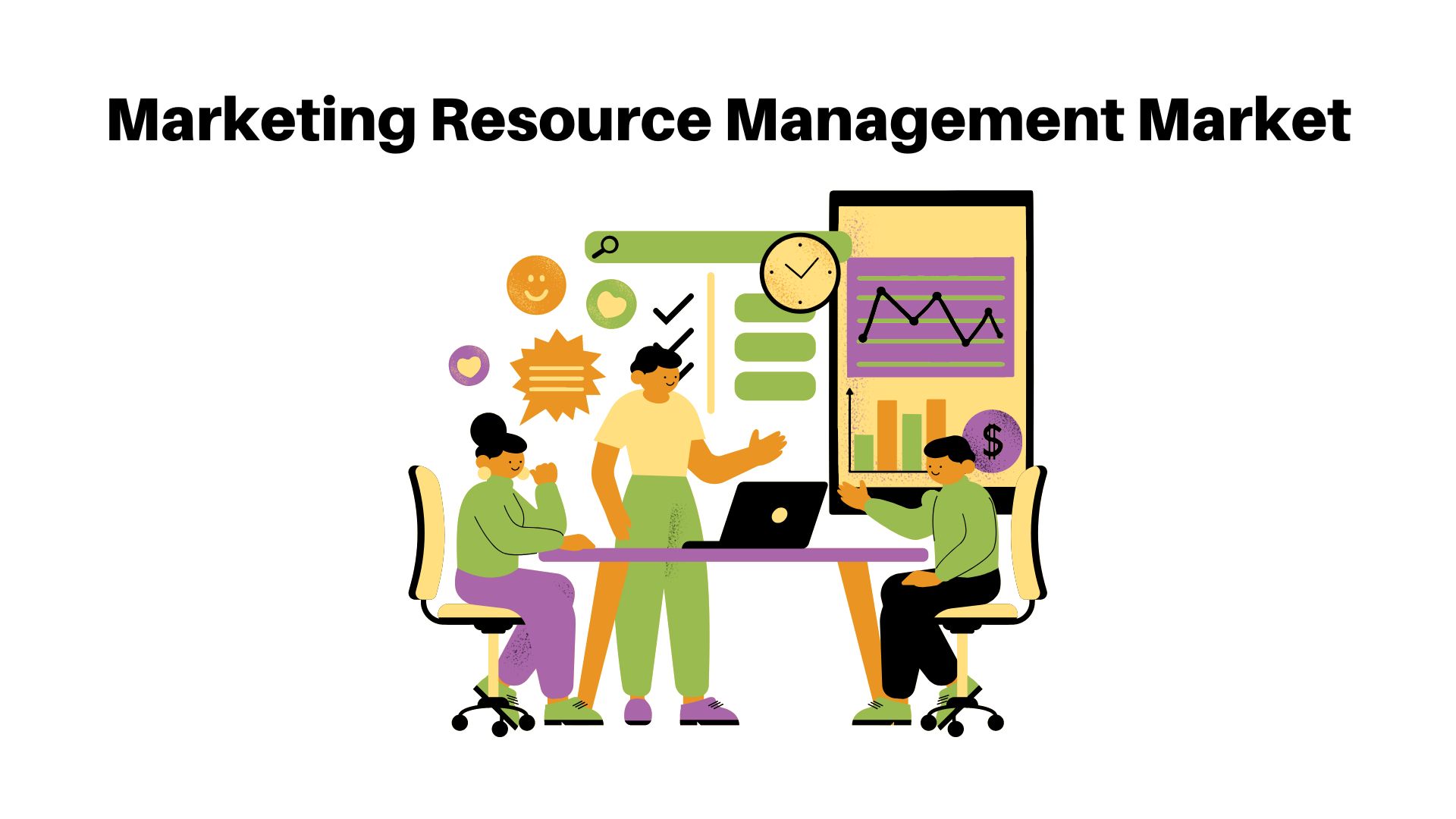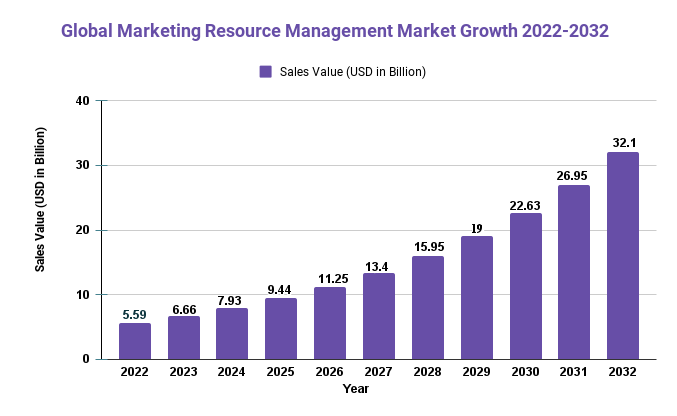Marketing Resource Management Market Value 32.10 bn +Trustworthy Data and Analysis by 2032

Page Contents
Marketing Resource Management Market is a type of software that aids marketing departments in managing and streamlining their marketing operations. This software can be used to manage projects, budget and plan, allocate resources, and track performance. The global MRM market is expected to continue growing in the next few years.
The Global Marketing Resource Management (MRM) market was valued in 2022 at USD 5.59 billion. By 2032, it is projected that it will reach USD 32.10 billion. This projection represents a 19.1% increase in the CAGR during the forecast period.
This growth can be attributed to several factors: the need for companies to optimize marketing operations; the increasing demand for cloud-based MRM solutions and the increasing adoption by small and medium-sized businesses of MRM solutions.
Overall, the market for Marketing Resource Management will experience strong growth as companies continue to prioritize efficient and effective marketing operations.
Would you like to access the statistical information, graphs, and key players' tactics? click here| https://market.us/report/marketing-resource-management-market/request-sample
Key Takeaways
The global MRM market is expected to experience a high compound annual growth rate over the coming years, with its size projected to surpass billions of dollars.
The increasing need for companies to optimize their marketing operations, the rising demand for cloud-based MRM solutions, and the rising adoption of these systems by small and medium-sized businesses are some of the factors fueling the market growth.
MRM software helps marketing departments efficiently manage and streamline their operations, such as project management, budgeting & planning, resource allocation, and performance tracking.
The MRM market is highly competitive, with numerous players providing a variety of solutions tailored to the requirements of different businesses.
The implementation of cutting-edge technologies, such as artificial intelligence and machine learning, is expected to fuel innovation in the MRM market and further amplify its capabilities.

Regional Snapshot
- North America: North America is the largest market for MRM, accounting for the highest revenue share in the global market. The presence of major players, such as Adobe, SAP, and IBM, in this region, is driving the market growth. The growing adoption of cloud-based MRM solutions and the increasing demand for marketing automation tools are also contributing to the growth of the market in this region.
- Europe: Europe is also a significant market for MRM, with the market size expected to grow at a considerable rate during the forecast period. The increasing adoption of digital marketing strategies and the need for efficient marketing operations are driving the growth of the market in this region.
- Asia-Pacific: The Asia-Pacific region is expected to witness significant growth in the MRM market due to the increasing adoption of digital marketing strategies and the growing demand for marketing automation tools. The rising number of small and medium-sized businesses in this region is also contributing to the growth of the market.
- Latin America: Latin America is an emerging market for MRM, with the market size expected to grow at a moderate rate during the forecast period. The growing adoption of cloud-based MRM solutions and the increasing demand for marketing automation tools are driving the growth of the market in this region.
- Middle East and Africa: The Middle East and Africa are also expected to witness moderate growth in the MRM market during the forecast period. The increasing adoption of digital marketing strategies and the growing demand for marketing automation tools are driving the growth of the market in this region.
Market Dynamics
Drivers
- Increased Need for Efficient Marketing Operations: As companies invest more heavily in marketing efforts and strive to maximize returns from campaigns, the need for efficient operations becomes ever greater. MRM software assists companies streamline these processes, foster collaboration between teams, and optimize their spending on advertising.
- Marketing Automation Tools Are Becoming Popular: Marketing automation tools are becoming more and more popular as companies look to automate repetitive marketing tasks and boost their efficiency in this area. MRM solutions often come equipped with marketing automation capabilities, making them an attractive option for businesses seeking these services.
- Adoption of cloud-based solutions: Cloud-based MRM solutions are becoming increasingly popular due to their advantages such as ease of access, scalability, and cost-effectiveness. Furthermore, these cloud-based MRM solutions don't require on-premises infrastructure – making them attractive options for businesses of all sizes.
- Focusing on customer experience: With companies placing more emphasis on customer experience, effective marketing campaigns become even more vital. MRM solutions enable companies to craft personalized messages that engage customers and improve the overall experience.
- Advances in Technology: Utilizing cutting-edge technologies such as artificial intelligence, machine learning, and predictive analytics is expected to spur innovation within the MRM market and enhance its capabilities. Companies can take advantage of these advancements by optimizing their marketing operations and increasing campaign effectiveness.
View Detailed TOC of the Report | https://market.us/report/marketing-resource-management-market/table-of-content/
Restraints
- High Implementation and Upkeep Costs: MRM solutions can be costly to set up and maintain, especially for small to medium-sized businesses with limited resources. This may pose a significant barrier to adoption for some organizations.
- Integration Challenges with Other Systems: For MRM solutions to be fully effective, they need to be integrated with other marketing and business systems. This integration can be a time-consuming and complex process which may deter some businesses from adopting MRM solutions.
- Lack of Skilled Personnel: MRM solutions require skilled personnel to implement and maintain, yet there is a shortage of qualified personnel with expertise in MRM. This makes it challenging for businesses to effectively take advantage of these solutions and utilize them efficiently.
- Security Concerns: Marketing data can be highly sensitive, and the use of MRM solutions may raise security issues. Businesses must guarantee that their MRM solutions abide by data protection regulations and implement adequate security measures to safeguard their information.
- Resistance to Change: Some businesses may find it difficult to embrace innovation and may prefer sticking with traditional marketing methods. Adopting MRM solutions necessitates a cultural shift within the organization, which could prove challenging to accomplish.
Opportunities
- Increasing Need for Customized Marketing: In order to engage customers and deliver a superior customer experience, businesses are increasingly using tailored marketing. Companies may create customized campaigns depending on the requirements and preferences of their client's thanks to MRM solutions.
- Digital marketing adoption: As businesses seek to use digital channels to connect with their target audiences, MRM solutions may help organizations manage their campaigns more successfully and efficiently.
- Expansion of Social Media Marketing: As more consumers rely on social platforms to connect with brands and make purchase decisions, social media marketing has become more essential than ever before. MRM solutions can assist companies in managing their campaigns as well as measuring its return on investment (ROI).
- Data Analytics' Growing Importance: Data analytics is becoming an increasingly vital element of marketing, as companies strive to use it for improved efficiency. Marketing resource management (MRM) solutions enable companies to collect, analyze, and visualize marketing data – giving them valuable insights that can inform their strategy.
- Use of cloud-based solutions on the rise: As businesses look to take advantage of the advantages of cloud computing, such as scalability, flexibility, and cost-effectiveness, they are increasingly adopting cloud-based MRM solutions. Companies may access their marketing data and tools at any time, anywhere with cloud-based MRM systems.
Challenges
- Competition from Other Marketing Technologies: The MRM market faces competition from other marketing technologies such as marketing automation, customer relationship management, and digital asset management. These solutions may offer similar capabilities to MRM solutions, making it difficult for MRM vendors to differentiate their solutions from their counterparts.
- Difficulty Demonstrating ROI: Demonstrating ROI for MRM solutions can be difficult due to marketing ROI being difficult to measure. MRM vendors must provide clear and compelling ROI metrics in order to convince businesses to invest in their solutions.
- Small and medium-sized businesses may find it difficult to adopt and utilize MRM solutions effectively, due to a lack of resources and expertise. To attract these businesses, MRM vendors need to offer cost-effective yet easy-to-use solutions at an attractive price point.
- Lack of Standardization: In the MRM market, there is a lack of uniformity which makes it difficult for businesses to compare and evaluate different solutions. To address this issue, MRM vendors need to collaborate in order to establish industry standards and best practices.
- Data Privacy Concerns: Marketing data can be delicate, so using MRM solutions may raise data privacy issues. In order to address these worries, MRM vendors need to implement adequate security measures and adhere to data protection regulations.
Recent Development
- On November 10, 2020, Oracle Corporation unveiled their cloud-based customer experience management solution “Oracle Digital Experience” for the communication industry. This system collects and analyses customer interaction data from front and back-office operations in order to boost sales and provide seamless services to customers.
- April 2018- Simple announced its partnership with Microsoft Corporation to utilize their comprehensive intelligent cloud platform and enhance their marketing platform by incorporating PowerApps functionality and redefining marketing resource management
Key Market Segments
Type
- Big Companies
- Small And Medium-Sized Enterprises
Application
- Retail Market
- Communications Market
- Financial Services
- Media
- Other
Key Market Players
- Teradata
- SAP
- SAS Institute
- Infor
- Brandmaker
- IBM
- Microsoft
- Adobe Systems
- North Plains Systems
- Workfront
Report Scope
| Report Attribute | Details |
| The market size value in 2022 | USD 5.59Bn |
| Revenue Forecast by 2032 | USD 32.10Bn |
| Growth Rate | CAGR Of 19.1% |
| Regions Covered | North America, Europe, Asia Pacific, Latin America, and Middle East & Africa, and Rest of the World |
| Historical Years | 2017-2022 |
| Base Year | 2022 |
| Estimated Year | 2023 |
| Short-Term Projection Year | 2028 |
| Long-Term Projected Year | 2032 |
Frequently Asked Questions
Q. What is the market size of the Global Marketing Resource Management Market?
A: According to a report by Market.us, the Global Marketing Resource Management Market was valued at USD 5.59 billion in 2022 and is projected to reach USD 32.10 billion by 2032, growing at a CAGR of 19.1% during the forecast period.
Q. What are the key segments of the Global Marketing Resource Management Market?
A: The Global Marketing Resource Management Market can be segmented on the basis of type, application, and geography. By type, the market can be segmented into Big Companies, Small And Medium-Sized Enterprises. By deployment, the market can be segmented into Retail Market, Communications Market, Financial Services, Media, and Other.
Q. Who are the key players in the Global Marketing Resource Management Market?
A: Some of the key players operating in the Global Marketing Resource Management Market include Teradata, SAP, SAS Institute, Infor, Brandmaker, IBM, Microsoft, Adobe Systems, North Plains Systems, and Workfront.
The team behind market.us, marketresearch.biz, market.biz and more. Our purpose is to keep our customers ahead of the game with regard to the markets. They may fluctuate up or down, but we will help you to stay ahead of the curve in these market fluctuations. Our consistent growth and ability to deliver in-depth analyses and market insight has engaged genuine market players. They have faith in us to offer the data and information they require to make balanced and decisive marketing decisions.